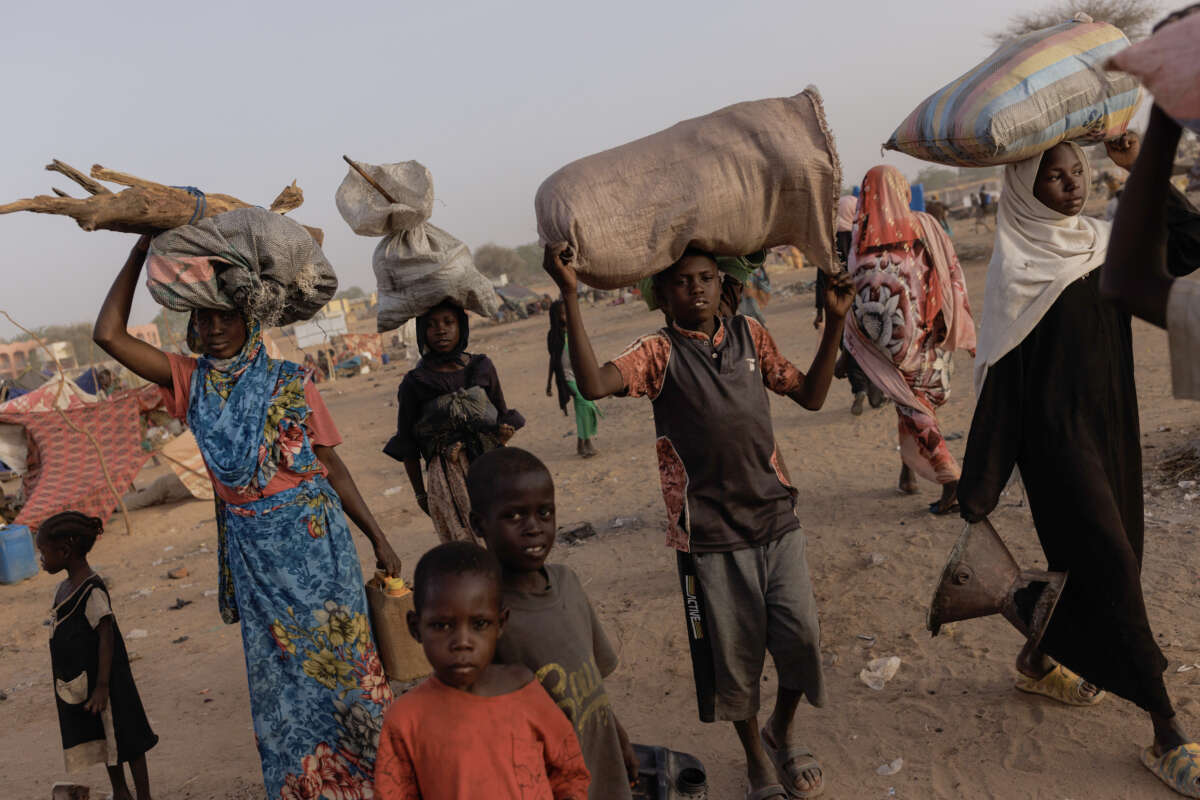Honest, paywall-free news is rare. Please support our boldly independent journalism with a donation of any size.
The United Nations’ top humanitarian affairs officials on Friday called for an immediate deescalation of hostilities in Sudan, where rival factions in the military government have been fighting for a year and where an attack on the city of El Fasher is reportedly imminent.
About 800,000 people in the city, the capital of North Darfur state, are in “extreme and immediate danger,” U.N. aid operations director, Edem Wosornu, told the U.N. Security Council earlier this week, as she reported that clashes between the Rapid Support Forces (RSF), a paramilitary group, and the Sudanese Armed Forces (SAF) are nearing El Fasher.
Fighting between the two groups has intensified in recent weeks, forcibly displacing an estimated 40,000 people.
The U.N. Office for the Coordination of Humanitarian Affairs said Friday that the security situation in North Darfur has left more than a dozen aid trucks with relief supplies for 122,000 people stranded in neighboring Northern state, unable to proceed into the only capital city in Darfur that is not controlled by RSF.
“A patchwork of armed actors, including the Darfur Joint Protection Forces, the SAF, and the RSF control different parts of the El Fasher area,” Human Rights Watch reported this week. “Tense calm alternating with episodic fighting has prevailed for months.”
Since April 14, when RSF began to push into El Fasher, at least 43 people — including women and children — have been killed due to fighting between the SAF and RSF.
“Civilians are trapped in the city, afraid of being killed should they attempt to flee,” said Seif Magango, spokesperson for the U.N. high commissioner for human rights, Volker Türk. “This dire situation is compounded by a severe shortage of essential supplies as deliveries of commercial goods and humanitarian aid have been heavily constrained by the fighting, and delivery trucks are unable to freely transit through RSF-controlled territory.”
The lack of humanitarian aid in North Darfur has pushed the state toward a famine, with one child dying of starvation every two hours, according to a February report by Doctors Without Borders.
In December, the U.S. State Department announced an $85 million sale of radar and other military equipment to the United Arab Emirates (UAE), which The New York Times reported last year has been covertly supporting the RSF.
U.S. Rep. Ilhan Omar (D-Minn.) proposed a joint resolution to block arms sales to the UAE in January, in light of its support for the paramilitary group.
Omar was among several lawmakers who wrote to President Joe Biden and Secretary of State Antony Blinken earlier this week, urging them to “deliver urgently-needed humanitarian assistance” and to help end the hostilities.
Sudanese-Australian writer Yassmin Abdel-Magied urged Americans on Friday to pressure lawmakers and the White House to take more action.
“There is a tiny window of opportunity for us to find a way to get the UAE… to make the RSF to stop in their tracks,” said Abdel-Magied. “Maybe there’s a way that we can avoid this massacre.”
OCHA called on the warring parties to “take constant care to spare civilians and civilian objects in the conduct of military operations.”
“They must, to the extent possible, avoid locating military installations within or near densely populated areas, including towns and camps for internally displaced people,” said the office. “It is also imperative that the parties allow safe passage for civilians to leave El Fasher for safer areas.”
Speaking against the authoritarian crackdown
In the midst of a nationwide attack on civil liberties, Truthout urgently needs your help.
Journalism is a critical tool in the fight against Trump and his extremist agenda. The right wing knows this — that’s why they’ve taken over many legacy media publications.
But we won’t let truth be replaced by propaganda. As the Trump administration works to silence dissent, please support nonprofit independent journalism. Truthout is almost entirely funded by individual giving, so a one-time or monthly donation goes a long way. Click below to sustain our work.
